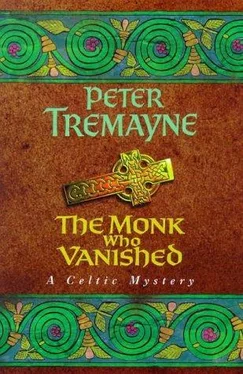Peter Tremayne - The Monk Who Vanished
Здесь есть возможность читать онлайн «Peter Tremayne - The Monk Who Vanished» весь текст электронной книги совершенно бесплатно (целиком полную версию без сокращений). В некоторых случаях можно слушать аудио, скачать через торрент в формате fb2 и присутствует краткое содержание. Жанр: Исторический детектив, на английском языке. Описание произведения, (предисловие) а так же отзывы посетителей доступны на портале библиотеки ЛибКат.
- Название:The Monk Who Vanished
- Автор:
- Жанр:
- Год:неизвестен
- ISBN:нет данных
- Рейтинг книги:3 / 5. Голосов: 1
-
Избранное:Добавить в избранное
- Отзывы:
-
Ваша оценка:
- 60
- 1
- 2
- 3
- 4
- 5
The Monk Who Vanished: краткое содержание, описание и аннотация
Предлагаем к чтению аннотацию, описание, краткое содержание или предисловие (зависит от того, что написал сам автор книги «The Monk Who Vanished»). Если вы не нашли необходимую информацию о книге — напишите в комментариях, мы постараемся отыскать её.
The Monk Who Vanished — читать онлайн бесплатно полную книгу (весь текст) целиком
Ниже представлен текст книги, разбитый по страницам. Система сохранения места последней прочитанной страницы, позволяет с удобством читать онлайн бесплатно книгу «The Monk Who Vanished», без необходимости каждый раз заново искать на чём Вы остановились. Поставьте закладку, и сможете в любой момент перейти на страницу, на которой закончили чтение.
Интервал:
Закладка:
‘It is exactly as Brother Madagan and I found it this morning. By the way-’ Ségdaeturned apologetically to Eadulf — ‘I was going to suggest that you share his chamber tonight for we seem to be overcrowded in our guests’ hostel. It is only for this night, mind you. We have a band of pilgrims passing through on their way to the coast to take ship for the holy shrine of St James of the Field of the Stars.’
‘I have no objection to sharing a chamber with Brother Madagan,’ Eadulf replied.
‘Good. Tomorrow night our guests’ hostel will be relatively empty again.’
‘And am I to share a room this night?’ asked Fidelma absently as she examined the chamber.
‘No; I have set aside a special room for you, Fidelma,’ Ségdae assured her.
Fidelma glanced around the chaos in the lamplight. She disliked to admit it, but Eadulf had been absolutely right. There was little to be seen by artificial light in the room. Important items could be lost among the shadows. She sighed and turned.
‘Perhaps it is best to examine this room in the light of the morning.’ She did not look at Eadulf as she admitted it.
‘Very well,’ agreed the abbot. ‘I shall secure it again so that nothing is disturbed.’
‘Tell me,’ she said, as Ségdaewas bending to lock the room again after they had emerged back into the corridor, ‘you mentioned that there were pilgrims filling your guests’ quarters. Do you have any other travellers staying here?’
‘The pilgrims, yes.’
‘No other travellers?’
‘No. Oh … unless you count Samradan, the merchant. You must know him. He is from Cashel.’
‘I do not know him, although I am told that he is known to my cousin, Donndubhain. What can you tell me of him?’
‘Little enough,’ shrugged the abbot. ‘He trades frequently with the abbey, that is all. I think he has been doing so for the last two years or so. I know he is from Cashel. He comes here often with his wagons of goods and stays as our guest while we negotiate barter.’
Fidelma nodded thoughtfully. ‘Wagons, you say? Who drives them?’
‘He has three companions but they prefer to stay in the inn in the township outside the abbey.’ He sniffed in disapproval. ‘Not the best of places for it has no good reputation. It is not a lawful inn for it has no licence from the local bó-aire, the magistrate. I have had to intervene once or twice with the innkeeper, a lewd woman named Cred, concerning her morals …’
Fidelma interrupted. She was not interested in the morals of the woman, Cred. ‘How long has Samradan been with you on this trip?’
Ségdae stroked the side of his nose as if it helped the process of his memory. ‘You seem very interested in this Sarnradán? Is he suspected of anything?’
Fidelma made a negative gesture with her hand. ‘No. I was just interested. I thought I knew most people who dwelt in Cashel, or of them, but Samradán I do not know. How long did you say he has been staying in the abbey?’
‘A few days. No, more like a week to be precise. You will meet him at the morning meal, no doubt. Perhaps he will inform you of those things you need to know. And now, should I show you to your quarters for the night?’
Eadulf smiled, happy at the thought. ‘A good suggestion, lord abbot. I am exhausted. It has been a long day filled with incident.’
‘Once you have refreshed yourselves,’ went on the abbot, ‘you will doubtless want to join the brethren for the midnight services.’
He did not notice the woebegone expression on the face of the Saxon as he conducted them along a corridor and across a cloistered courtyard.
‘This is our domus hospitale ,’ he said, indicating a door. ‘Our guests’ hostel,’ he added as he knocked once.
A figure appeared in the doorway. A short shadowy figure whose silhouette clearly identified the sex of the person.
‘This is our domina, Sister Scothnat.’
Eadulf had not realised until that moment that the Abbey of Imleach was a conhospitae, a mixed house in which religious of both sexes lived and worked together. Such ‘double-houses’ were rare among his own people but he knew that both the Britons and the Irish religious foundations were based on such cohabitation.
‘This is Sister Fidelma, Scothnat.’
Sister Scothnat bobbed nervously for she knew that Fidelma was the sister of the King.
‘I have your room prepared, lady,’ she announced breathlessly. ‘As soon as the abbot informed me that you had arrived, I prepared it.’
Fidelma held out a hand and touched Sister Scothnat lightly on the arm. Usually, among her fellow religious, she made no distinction of her relationship with the King of Muman. Only when she needed that extra authority did she make the point.
‘My name is Fidelma. We are, after all, Sisters of the Faith, Scothnat.’ She turned to Ségdae and Eadulf. ‘Until the midnight service, then. Dominus vobiscum .’
‘Dominus tecum,’ responded Ségdae solemnly.
The abbot conducted Eadulf across the cloistered courtyard once again into a corridor on the far side where they found a tall religieux who greeted them.
‘Madagan,’ saluted the abbot. ‘Excellent. We were coming in search of you. This is Brother Eadulf. Because of the pilgrims in the domus hospitale this night, I have suggested that he share your chamber as you have a spare bed there.’
Brother Madagan cast a searching glance over Eadulf, as if assessinghim. His eyes were cold and when he smiled there was no warmth in the expression.
‘You are most welcome, Brother.’
‘Good.’ The word on Ségdae’s lips seemed to be at odds with his unhappy tone. ‘Then, Brother Eadulf, I shall see you at the midnight service.’ With a distracted expression, the abbot disappeared.
‘I am the steward of the abbey,’ Madagan announced confidingly, as he drew Eadulf towards a door in the corridor. ‘My chamber is larger than most so I think you will find it comfortable.’
He threw open the door of a chamber which contained two small cots, one table and chair. A candle stood on the table. The whole was exceptionally neat with nothing else on the table by the candle except a small leather-covered book. Another table stood behind the door on which was a bowl, a jug of water, and some drying cloths.
Brother Madagan pointed to one of the two cots in the small cell. ‘That will be your bed, Brother … sorry, I cannot pronounce your Saxon name. It is hard to my poor ears.’
‘Ah’dolf,’ pronounced Eadulf patiently.
‘Does it have any meaning?’
‘It means “noble wolf’,’ explained Eadulf with some degree of pride.
Brother Madagan rubbed his chin pensively. ‘I wonder how that should be translated into our language? Perhaps, Conrí — king of wolves?’
Eadulf sniffed deprecatingly. ‘A person’s name does not need to be translated. It is what it is.’
‘Perhaps so,’ admitted the steward of the abbey. ‘May I say that you speak our language well?’
Eadulf sat himself on the bed and gently tested it. ‘I have studied at Durrow and Tuaim Brecain.’
Madagan looked surprised. ‘Yet you still wear the tonsure of a stranger?’
‘I wear the tonsure of St Peter,’ corrected Eadulf firmly, ‘cut in memory of the crown of thorns of Our Saviour.’
‘But it is not the tonsure that we of the five kingdoms wear nor that which the Britons nor the men of Alba nor Armorica wear.’
‘It is the tonsure of all those who follow the Rule of Rome.’
Brother Madagan pursed his lips sourly. ‘You are proud of your tonsure, noble wolf of the Saxons,’ he observed.
‘I would not wear it otherwise.’
‘Of course not. It is merely that it is outlandish to the eyes of the brothers here.’
Читать дальшеИнтервал:
Закладка:
Похожие книги на «The Monk Who Vanished»
Представляем Вашему вниманию похожие книги на «The Monk Who Vanished» списком для выбора. Мы отобрали схожую по названию и смыслу литературу в надежде предоставить читателям больше вариантов отыскать новые, интересные, ещё непрочитанные произведения.
Обсуждение, отзывы о книге «The Monk Who Vanished» и просто собственные мнения читателей. Оставьте ваши комментарии, напишите, что Вы думаете о произведении, его смысле или главных героях. Укажите что конкретно понравилось, а что нет, и почему Вы так считаете.












